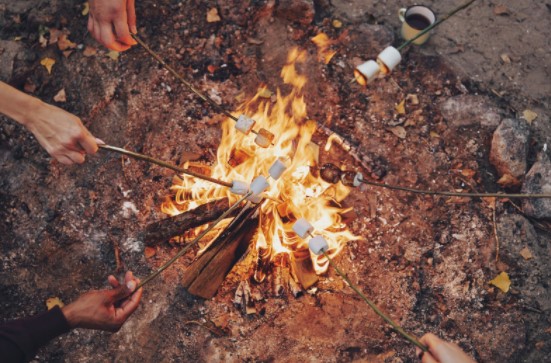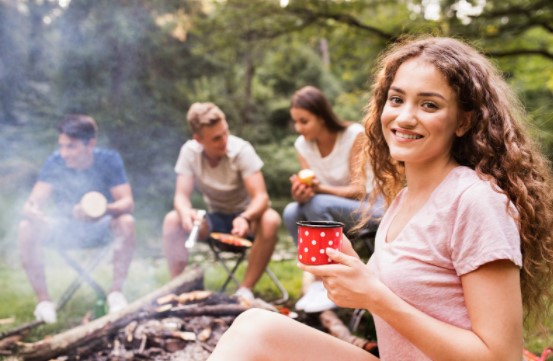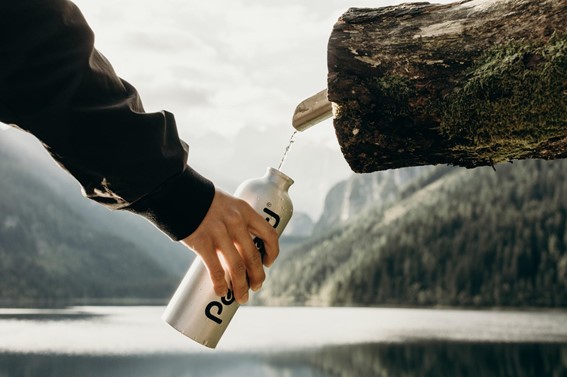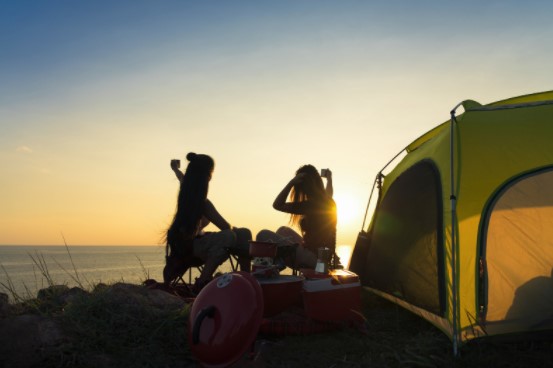Table of Contents
Camping Food Safety
One of the best parts of camping is cooking a delicious meal to enjoy together. Camping fare is usually simple but something about it is always extremely delicious. From burgers to wings to stews, camping food is always sure to satisfy your stomach. However, as you’re cooking outdoors, there are many chances for your food to be contaminated or dirtied.
In the best-case scenario, some people will end up feeling ill with stomach aches. In the worst-case scenario, people might end up infected with dangerous microbes, chemicals, or toxins. Therefore, knowing how to cook safely and hygienically when camping is important. In this article, we will list all the rules of cooking safely when camping. For more expert tips on camping, visit The Expert Camper.
1. Keep Your Cold Food Cold
One of the most important aspects of food safety is keeping your cold food cold. This is the number one way to protect your food against microbes, organisms, insects, and spoiling. This is especially important for meats and you would want to keep them as cold as possible. A great way to ensure this is by freezing all your meats beforehand. Then, when you’re ready to leave, load it into a cooler to keep cold. A cooler works because it will retain the cold air and keep insects, germs, microbes, and any other forms of contamination from getting to the food.
 To further keep your food cold, you can also freeze bottles of water, juice, and milk beforehand to use as ice packs. When necessary, these bottles can be taken out to be defrosted and drunk. This helps prevent the need to pack ice into your coolers and consequently, helps to save valuable space.
To further keep your food cold, you can also freeze bottles of water, juice, and milk beforehand to use as ice packs. When necessary, these bottles can be taken out to be defrosted and drunk. This helps prevent the need to pack ice into your coolers and consequently, helps to save valuable space.
2. Only Eat Meat That Is Kept At A Temperature Below 40°F
Meats are most susceptible to contamination by insects, microbes, or parasites. Therefore, it is most important to ensure that they are kept at a temperature below 40°F. At anything above this temperature, your meat can be contaminated, and refreezing them is not recommended. As you are out in the open, it is also impossible to safely say that you would be able to sterilize them. You would also not want to take your chances when out in the wild. Therefore, always stick to this rule and ensure that you cook your meat before it goes past the 40°F temperature mark. It’s always better to be safe than sorry.
3. Cook Your Meat Thoroughly And Properly
Next, remember to cook your meat thoroughly and properly. When you’re out in a restaurant or at home, it might be fine to eat your beef when undercooked. However, when you’re out in the wild, the chances of contamination are much higher and hence, it’s better to cook all your meat thoroughly. For ground beef, pork, lamb, veal, and other similar meats, it is best to cook them to a temperature of 160°F. For hot dogs and poultry, cook them to a temperature of 165°F. And lastly, for unground beef, pork, lamb, and veal, cook them to a temperature of 145°F.
 To ensure that you reach these temperatures, it would be good to have a meat thermometer. This will allow you to check the internal temperature of the meat and ensure that it is well-cooked. Thereafter, remember to sterilize the meat thermometer before using it again. Alternatively, you can bring multiple thermometers to use.
To ensure that you reach these temperatures, it would be good to have a meat thermometer. This will allow you to check the internal temperature of the meat and ensure that it is well-cooked. Thereafter, remember to sterilize the meat thermometer before using it again. Alternatively, you can bring multiple thermometers to use.
4. Ensure No Cross-Contamination
Another important safety measure is to prevent cross-contamination. Not all your meats will be contaminated but if you don’t prevent cross-contamination, all your meats will be contaminated. Therefore, be careful to not touch different items with unwashed hands and utensils. Instead, remember to always wash your hands with soap before and after handling any meat, food, utensils, dishware, and items. The same goes for your cooking utensils and containers, always remember to wash them before and after each use.
5. Avoid Keeping Leftovers
It is also important to avoid keeping any leftovers as you would not be able to keep them as cold as necessary. Unless you have a functional refrigerator with you, your food has a high chance of being infected or spoilt. Therefore, try not to keep any leftover food. This goes for both cooked and uncooked food. If you do keep leftover cooked food for your next meal, make sure you properly reheat your meal to ensure that any bacteria or microbe will be killed off. And, if you do not want to waste food, try to pack and cook exactly the amount of food that you will need. If you do have food to throw away, don’t throw them away at the campsite as it could attract animals and insects to you.

6. Only Use Clean Water
Lastly, it is important to use safe water for drinking and cooking. Don’t drink water from any random source as you never know what kind of insects, parasites, or bacteria may be present in the water. If possible, always bring clean water with you to use during your trip. Or, if your campsite has a certified clean source of water, that would be alright to use. However, try to avoid ever using water from streams, rivers, lakes, or ponds for drinking or cooking. If you have camping water purifiers, save that for an emergency situation. You may think that it is safe to use water from lakes, ponds, streams, or rivers to cook because you will boil the water and purify it. However, you do not know what’s in the water. If there are hazardous toxins, boiling it will not be enough and it could still cause harm to your body. Therefore, the best solution would be to always bring clean and pure water for yourself to drink and use for cooking.
Conclusion
In conclusion, it might seem fussy to think about all of these measures when cooking during a camping trip. After all, camping trips are about relaxing and having fun, why stress so much about cooking? However, it is important because there are many ways that you could accidentally harm yourself if you are unsafe while cooking. Therefore, we strongly urge you to keep these measures in mind as you cook outdoors.
Author Profile

- Blogger by Passion | Contributor to many Business Blogs in the United Kingdom | Fascinated to Write Blogs in Business & Startup Niches |
Latest entries
 FinanceFebruary 26, 2026Centrepay End Dates Make Repayments More Predictable for Centrelink Borrowers
FinanceFebruary 26, 2026Centrepay End Dates Make Repayments More Predictable for Centrelink Borrowers FinanceFebruary 26, 2026Payday Loans Get Better Product Matching Under Target Market Rules
FinanceFebruary 26, 2026Payday Loans Get Better Product Matching Under Target Market Rules CareerFebruary 26, 2026Is Graphic Design a Good Career for the Future?
CareerFebruary 26, 2026Is Graphic Design a Good Career for the Future? FinanceFebruary 7, 2026The Main Types of Online Fundraising Used by Charities
FinanceFebruary 7, 2026The Main Types of Online Fundraising Used by Charities





